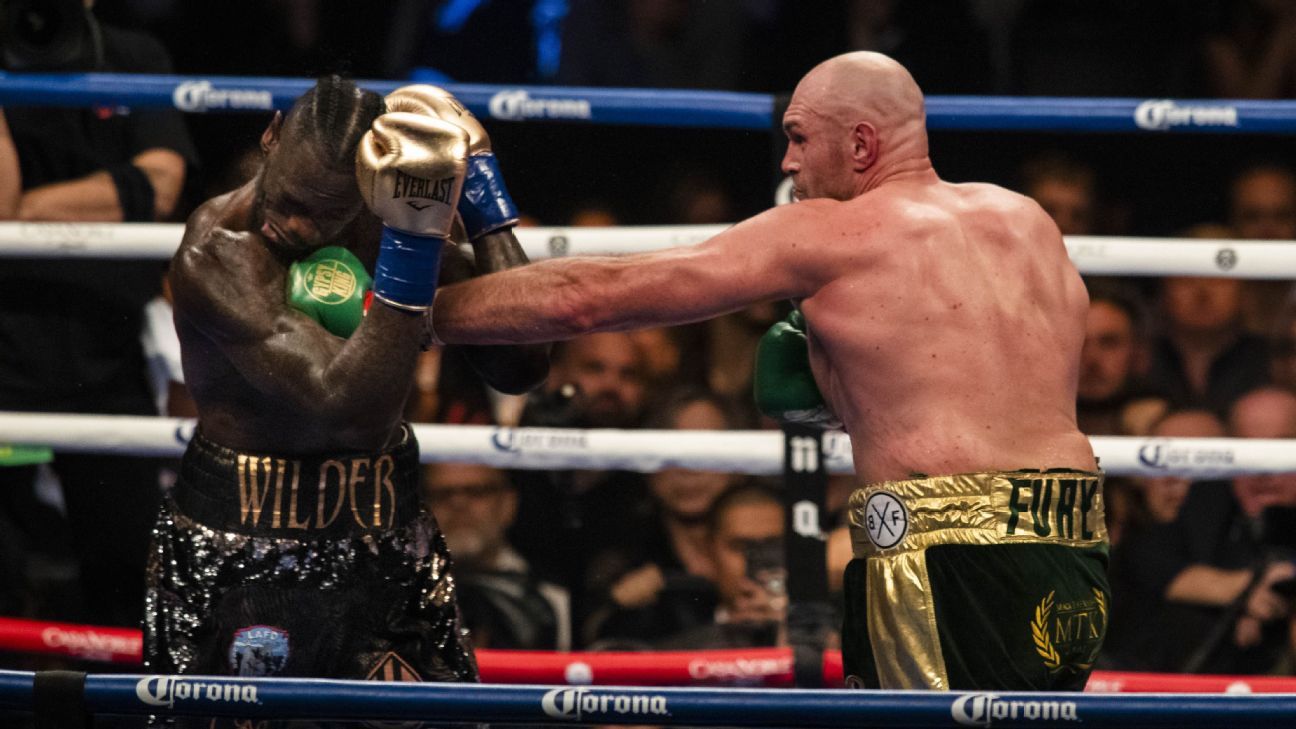Heavyweight world titlist Deontay Wilder and lineal champion Tyson Fury are officially set to meet in a mega-rematch on Feb. 22 at the MGM Grand in Las Vegas, in the main event of a joint pay-per-view between ESPN/Top Rank and Fox/Premier Boxing Champions.
Their first fight on Dec. 1, 2018, at Staples Center in Los Angeles, which ended in a split draw, was a very good fight. Fury (29-0-1, 20 KOs) outboxed Wilder (42-0-1, 41 KOs) for long stretches, but Wilder scored two knockdowns in the ninth round and a crushing third in the 12th round that Fury amazingly survived. They have each won two bouts since, and are now primed for the first big fight of 2020.
Now that the much-anticipated bout is official, here’s how we see several key factors playing out.
How do you see the rematch going?
Rafael: I see the rematch going very much like the first meeting, but Wilder perhaps being a bit more aggressive as the fight goes on and Fury boxing as if his life depended on it. Fury could be better since the first bout, which he took after two low-level comeback fights. But Wilder also could also be better, since he now knows how to deal with Fury’s long reach and height.
Kim: What took place in the first fight, when Fury riddled Wilder with his jab and movement, will probably be what the second bout will look like. The reason is very simple: Fury is a consummate boxer, who prefers to pick his opponents apart from the outside, and Wilder is the consummate puncher, who is fundamentally flawed in certain ways but perpetually dangerous because of his devastating right hand.
If you look at Wilder’s record, there are many fights where he’s dropped more than a few rounds early on and finds himself down on the scorecards. But Wilder has the proverbial “eraser” (41 knockouts in 42 professional victories) that makes all of that null and void. As for Fury, he tends to perform up or down based on the level of opposition that he’s facing. While there is a chance he might have overlooked Otto Wallin just a tad in his most recent fight, that won’t be the case against Wilder, given the stakes.
Will bringing in Anthony Joshua as a training partner and having a new head trainer help Fury?
Rafael: First off, I do not believe for one moment that Joshua will actually be in Fury’s training camp or actually spar with him. It was a good story that got a lot of people talking, and it was nice of Joshua to offer and it surely would be interesting, but I am extremely — EXTREMELY — skeptical that it will actually come to pass. It would be incredibly unusual for two of the top three elite heavyweights to spar with each other, particularly since an eventual fight between Joshua and Fury would be massive, especially in the United Kingdom.
As for a new head trainer, Javan “Sugar” Hill is a true pro and has legendary bloodlines as the nephew of the late, great Hall of Fame trainer Emanuel Steward. Fury and Hill have known each other for many years, going back a decade to when Fury spent time in the Steward camp. I thought Ben Davison did a great job with Fury, but a fighter has to be comfortable with his trainer. Fury obviously was no longer comfortable with Davison, so he made a change. I don’t think going with another excellent trainer can hurt Fury, but I also don’t know how much they can really change or improve upon in just a couple of months together. It takes at least a few fights for a fighter and trainer to truly mesh.
Kim: Well, it doesn’t seem like this will happen, but it certainly grabbed a few headlines. It was a tad reminiscent of the movie “Rocky III,” when Apollo Creed offered up his services to prepare Rocky for his rematch with Clubber Lang. With that being said, it seemed Joshua was just trolling Wilder and his legion of fans. At this stage of his career, and given his standing in the sport, Joshua will not serve as a sparring partner for anybody. Those days are long past.
Now, having a new trainer is a much more serious issue for Fury. It surprised more than a few observers when Davison and the colorful heavyweight parted ways. In fact, on the night of Nov. 23, as Wilder stopped Luis Ortiz in their rematch, Davison was in Las Vegas scouting Wilder from ringside at the MGM Grand in Las Vegas.
The reality is that Fury is already a finished product as a fighter. With 30 fights under his belt, and at age 31, Fury is what he is. What will be interesting to see is how they will mesh on fight night, and if Hill will implore Fury to be a bit more aggressive at times, in order to perhaps take some steam off of Wilder’s right hand.
Can Fury neutralize Wilder’s power/right hand?
1:14
Tyson Fury believes he can’t trust the judges and must knock out Deontay Wilder to win, which is something he’s “one million percent” confident will happen.
Rafael: Wilder has 43 professional fights, and other than Bermane Stiverne, in a one-sided decision loss when Wilder won his world title in 2015, nobody has neutralized that right hand. Wilder has 41 knockouts, the distance domination versus Stiverne and the draw with Fury, who did not neutralize the right hand as it landed on the money twice and resulted in knockdowns. Wilder’s right hand is like Mariano Rivera’s cut fastball. Everybody in the place knows it’s coming but it’s still hard to solve. Everybody knows Wilder is looking to set up the right hand, and it usually lands, no matter who you are.
Kim: That’s exactly what Fury did for large stretches in their first fight. There is no other active heavyweight who has the ring IQ of “The Gypsy King.” He has an educated left hand, a live set of legs and an understanding of distance and spacing. He has a clear identity as a boxer that he sticks to. But remember this: It’s nearly impossible to pitch a no-hitter at the world-class level. Eventually, everybody gets punched in that ring at a certain point.
Wilder put it best when he said that while his opponents basically have to be perfect for 36 minutes, he has to be perfect for only about 2 seconds.
What does Wilder need to do differently
Rafael: I was in the minority who thought Wilder did enough to win the first fight, giving him the edge in a couple of close early rounds as well as extra points for the knockdowns. But Wilder did get outboxed for long stretches, and he needs to make sure he brings the fight to Fury more consistently. He needs to be aggressive and make his shots count. He’ll have to pressure Fury, hit him anywhere he can with his powerful right hand, go for the scar tissue over the right eye that was badly cut in Fury’s previous fight and also set up his shots with a jab that sometimes gets lazy. All Wilder needs is one good shot and he can end the fight. He knows it, and that makes him one of the most dangerous fighters in boxing today.
Kim: Be first. If you go back to the first meeting, Fury set the pace and dictated the tempo of the fight by getting off his jab faster than Wilder, who often was stuck defending himself from Fury’s lead hand. Wilder is not a counterpuncher — he’s not the type of fighter who is adept at slipping, rolling and then firing back his own punches. Generally he is more effective when he is initiating the action, coming forward and eventually finding openings for his right hand.
He might not outjab Fury, but Wilder can’t allow Fury to always be the guy that is beating him to the punch. Often, the way you can neutralize the jab of your opponent is to jab right along with them.
What does Fury need to do differently?
Rafael: Fury boxed very well for long stretches the first time around, and many thought he deserved the victory rather than a draw. Based on that, I don’t think he needs to change a whole lot or do anything radical. The main thing is to continue to be wary of Wilder’s right hand, keep his own hands up to protect his chin and the scar tissue over his eye and do not — under any circumstances — get reckless, get into exchanges, drop his hands or put his back on the ropes. He needs to keep the fight as close to the center of the ring as possible. All of those things are easier said than done, but to win, Fury will need the utmost discipline for every second of the fight, because with Wilder’s absurd power the fight can be over in the blink of an eye on any punch.
Kim: Fury really needs to do exactly what he did in the first clash with Wilder, where the consensus was that he won eight or nine rounds. But should he find himself in the same situation in the rematch, he can’t get complacent as he did in the late rounds last year, when he hit the deck in the ninth and 12th rounds.
It was a bit puzzling that, going into the final round of the first fight, that instead of playing keepaway and going into the four corners for the final three minutes, Fury really didn’t act like he had a lead to protect and he paid dearly for it. That 10-8 round on the cards cost him the fight, as he had to settle for a disputed draw.
What is your prediction?
Rafael: It’s still early. I’d like to see how the guys look and behave with each other and see how Fury seems to be dealing with his new training situation. But my view is this: Wilder is the best puncher in boxing, and he dropped Fury twice in the first fight — and it was only by a miracle that Fury survived the very hard knockdown in the 12th round. Wilder will knock him down again late in the fight, but this time he will register the knockout.
Kim: While Fury is the superior technician and ring general, you get the sense that at a certain point Wilder will land the perfect punch. This might sound simplistic, but the fact is that all 43 of his opponents have either hit the canvas against him or been knocked out. As Ortiz found out in two fights with Wilder, you might win a good number of the battles, but you will eventually lose the war. Nobody has the equalizer that Wilder has. No matter how far he gets down on the cards, or how dire the situation might get, Wilder never stops believing in his ability to land that game-changing punch.

